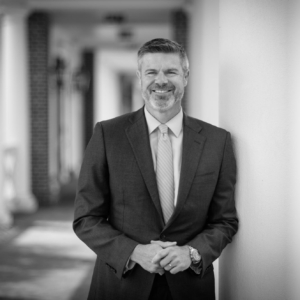
Business schools around the world are making a concerted effort to put their sustainability studies into practice on their own campuses. None can claim to be doing more than the Darden School of Business at the University of Virginia.
Darden has been leading in the sustainability space for a long time: In the 1990s it became one of the first B-schools to launch courses in the subject. But its commitment goes beyond what’s taught in the classroom to the impact of the classrooms themselves, and the buildings that contain them. Darden first set sustainability goals in 2009, and after it achieved carbon neutrality four years ago — one of the first B-schools to do so — it immediately established significant carbon emissions reduction targets that it plans to achieve by the end of the decade.
The Darden School’s efforts gained international recognition earlier this year when The Financial Times released its 2023 Global MBA ranking. In it, the UK-based magazine included a brand-new metric measuring a B-school’s carbon footprint, and Darden — which FT ranked 17th overall this year — earned the top spot.
THE CARBON FOOTPRINT RANK: 8 SCHOOLS IN 6TH, 12 IN 17TH — AND DARDEN TOPS THEM ALL

Virginia Darden’s Mike Lenox: “Our track record on sustainability is long, and it’s great to receive national recognition for the decades of work”
FT’s inaugural carbon footprint rank was calculated using universities’ and B-schools’ own carbon emissions targets and publicly announced reports for the last three years. As the magazine explains in its methodology, “New emphasis has been given to the environment,” with “fresh credit” given for schools that provided the magazine a recent public carbon emissions report complying with international standards.
While the carbon footprint ranking itself is a bit messy — eight programs are in sixth place and 12 are tied at a rank of 17; eight more are tied for 89th place, which is essentially dead last — Darden’s honor is nonetheless well-earned. The Charlottesville school beat out such European sustainability stalwarts as SDA Bocconi School of Management and IE Business School, which were tied for second in the category, as well as a host of California schools, five of which crowded into the top 13 spots. (See the next page for the entire 100-school carbon footprint ranking.)
“We were honored to be named the top school for carbon footprint by The Financial Times,” says Mike Lenox, Darden’s Tayloe Murphy professor of business administration and senior associate dean and chief strategy officer. “Several of our faculty pioneered sustainability courses dating back to the 1990s, and we were one of the first schools to announce sustainability goals in 2009. We believe in practicing what you preach, and our ‘How We Learn’ and ‘How We Live’ efforts support that belief.”
‘COMMITTED TO LEADING ON SUSTAINABILITY’
Darden’s “How We Learn” goals are its key sustainability objectives for internal operations by 2030. They include not only major emissions reductions but also electrifying all fossil fuel infrastructure (such as kitchens and hot water heaters) on campus, reducing both water use and waste to landfill by 30% of 2010 baseline, and sustainably sourcing 50% of the school’s food. The school is also planning a new arboretum and botanical garden on its Charlottesville campus.
As Mike Lenox points out, Darden has long been a sustainability leader in the classroom as well — and it has ambitious goals there, too. Its “How We Learn” goals for curriculum development and faculty scholarship by 2030 include developing 100 new teaching cases and notes on sustainability topics and delivering 100 courses on sustainability topics.
“The focus on sustainability not only makes sense for Darden but for the world going forward,” Lenox tells Poets&Quants. “Our track record on sustainability is long, and it’s great to receive national recognition for the decades of work, both in the classroom and on Grounds. Through our 2030 goals, the school is committed to leading on sustainability but also working in partnership with other business schools to educate the next generation of responsible business leaders.”
Q&A WITH MIKE LENOX, VIRGINIA DARDEN SENIOR ASSOCIATE DEAN & CHIEF STRATEGY OFFICER
Poets&Quants: According to FT, in this year’s MBA ranking, “Fresh credit is given for schools providing a recent public carbon emissions report complying with international standards, and also for setting near-term zero emission targets.” And in the new carbon footprint ranking Darden is No. 1. What were the highlights in Darden’s report that won the No. 1 rank for carbon footprint?
Mike Lenox: In 2019, Darden met its goal of reaching carbon neutrality through a partnership with Dominion Energy that helped to build a new Hollyfield Solar Plant from which UVA and Darden purchase power. We are one of the few business schools to reach this milestone and are proud to be recognized by The Financial Times for being a leader in this space.
We believe we can do more, which is why we created a new set of 2030 goals around “how we live” (operations) and “how we learn” (student engagement). The University of Virginia publishes an annual Sustainability Report that Darden contributes to each year, and we are also in the process of creating our own dashboard and reporting documents, which will be made available on the School’s sustainability webpage.
Please provide an update on the school’s progress toward its 2030 sustainability goals. Is the school on track after Covid?
Shortly after releasing the 2030 goals, a Sustainability Advisory Council was created to help guide and advance the School’s sustainability projects. The Council is made up of Darden student club leaders, alumni, board members, faculty, and staff who share a personal or professional commitment to sustainability. With the Council’s assistance, we have launched several projects that seek to expand our sustainability curriculum and student offerings and further reduce our waste on grounds.
This includes an initiative to reduce and compost paper cups at First Coffee, a daily community gathering of students, staff, and faculty, where students are provided with reusable tumblers at the start of the school year. Work is underway to expand composting across grounds and we are also exploring sustainably sourced food partnerships. We have reduced our waste by 60% and are on track to meet our goal of 70% by 2030 (30% of our baseline).
Efforts are underway to expand the number of sustainability electives for second year students and incorporate sustainability into the core curriculum, including revising and writing new case studies that touch on sustainability topics. In response to student interest, Darden will roll out a new ESG Concentration later this year. Through a new Sustainability Initiative launching this Fall, we will work to identify more opportunities for students interested in sustainability-focused careers to identify special projects, internships, and post-graduate placements.
At Darden, we believe that our faculty and research can help to influence business leaders around the world, and we will continue to engage the broader community in discussions around sustainability. For example, last year Darden hosted a Jefferson Innovation Summit based on my and Batten Institute Director Becky Duff’s research for The Decarbonization Imperative: Transforming the Global Economy by 2050.
What does it say about the evolution of business schools’ teaching of sustainability that the FT ranking now includes carbon footprint as a metric? What does it indicate about the interests of MBA candidates? Do you see domestic U.S. enthusiasm for sustainability matching or lagging international?
Darden has always been about developing responsible business leaders, so the theme of purpose-driven leadership is baked into our curriculum. This commitment to ethical business is driven by work done by Darden professor Ed Freeman on Stakeholder Theory, which argues that businesses should create value for all stakeholders including customers, suppliers, employees, investors, and communities.
Social issues of global importance have long been an interest of our students but in the last five years, we have seen a significant uptick in the number of requests for sustainability courses and experiential opportunities. Outside of Darden, MBA-focused sustainability conferences like ClimateCAP are selling out in just a few hours.
The new FT ranking seems to recognize this recent rise in student interest but also, the increasing demand from companies for graduates that understand the potential impact of climate change on operations regardless of career focus.
See the next page for the complete 100-school Financial Times ranking of global business schools by their carbon footprint.











Questions about this article? Email us or leave a comment below.